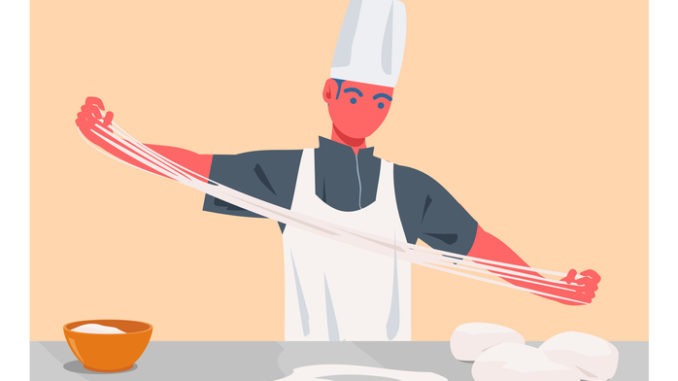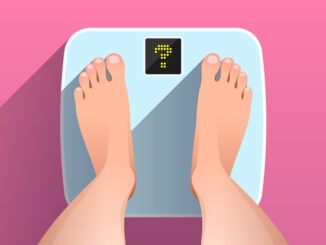
Everyone has heard of gluten and there is much discussion about ‘gluten-free diets’. So, what is it and why can it cause problems for some people? Dr Paul Lambden explains
Gluten is a family of proteins found in a variety of grains including wheat, rye and barley. The two main proteins are glutenin and gliadin and it is the gliadin that is responsible for most of the adverse health effects of gluten.
In the preparation of dough, flour is mixed with water and the resultant product forms a sticky mass with a glue-like consistency. This is a desirable property for bread-makers because it results in bread which is chewy, enabling it to rise during the baking process and providing the texture that we enjoy in our sandwiches. The name ‘gluten’ is derived from the property of the dough which makes it ‘glutinous’.
The important factor about gluten is that its elimination from the diet is essential in patients with coeliac disease and other conditions associated with the consumption of gluten. Some people advocate its avoidance even when a gluten-related condition has not been diagnosed because, they claim, its exclusion is associated with weight loss, increased energy and better general health.
Gluten is recognised for its involvement in some medical disorders:
- Coeliac disease. This is a bowel disorder and occurs because the presence of gluten in the gut triggers an immune system reaction which results in damage to the lining of the small intestine. Other symptoms may be fatigue, weight loss, rashes and infertility. Over time the damage results in the prevention of absorption of nutrients from food, which can result in osteoporosis or iron deficiency anaemia. Coeliac disease is an autoimmune disorder. There is no cure for coeliac disease.
- ‘Non-coeliac’ gluten sensitivity. In this condition there is no identifiable damage to the lining of the small bowel but the symptoms which occur may be similar to those of coeliac disease, namely abdominal pain, diarrhoea or constipation and bloating. There may also be non-specific rashes, headache and feelings of dissociation. It is believed that the immune system plays a role but the process of symptom development has not been elucidated.
- Gluten ataxia results from immunological damage to the cerebellum, the columns of nerves in the spinal cord and some peripheral nerves. It may result in unsteadiness or difficulty walking or talking. Affected individuals may occasionally appear as though they are drunk.
- General allergic reaction. This is a general allergic response with features such as nasal congestion and breathlessness. It is believed to be associated with the body’s immune system mistaking the gluten protein for a virus or bacterium and producing antibodies.
Studies of gluten intolerance suggest that about one in every 125 people have the condition and also that it is likely that one-in-ten of their relatives will also have the intolerance.
What foods contain gluten?
- Wheat. Different varieties all contain gluten.
- Barley.
- Rye.
- Oats in some forms.
- Triticale (a cross between wheat and rye).
- Semolina.
Gluten-free foodstuffs include:
- Grains including:
- arrowroot
- corn
- buckwheat
- flax
- millet
- quinoa
- rice
- soy
- tapioca (for those who weren’t put off it at school!).
- Fruit and vegetables.
- Nuts.
- Beans, seeds and legumes.
- Eggs.
- Lean meat, fish and poultry.
- Low-fat dairy products.
For people avoiding gluten it is important to read food labels; if grain is included in the product the label should show the name of the grain. Some labels will indicate that the food is naturally gluten-free and some may indicate processing to remove gluten.
There are a number of foods which, particularly when eating out, should be checked if gluten is to be avoided. Common products include:
- French fries.
- Hot dogs.
- Processed luncheon meat.
- Cakes and pies.
- Sauces.
- Seasoned snacks.
- Soups.
- Vegetables in sauce.
Even on the Sabbath, one should be wary of communion wafers.
For people adhering to a gluten-free diet, care and monitoring of foodstuffs may be a lifelong requirement. However, for some of those people with non-coeliac gluten sensitivity, it may not be permanent and, after pursuing a gluten-free diet for a period, a normal diet can be restarted to assess whether the gluten sensitivity persists.
For those people with gluten sensitivity, avoidance of gluten can result in improved general health and recovery of gastro-intestinal health and function; it may also result in weight loss. However, it is important to remember that that many foodstuffs which may contain gluten are also rich in vitamins, such as the B group, and minerals such as calcium and iron.
The costs of prepared gluten-free foods are generally higher than the cost of the gluten-containing equivalent. The resulting increased expenditure can be a significant addition to the family budget, especially if it includes foods that aren’t naturally gluten-free. These days, supermarkets all have a wide range of gluten-free products, which has reduced the cost to some extent, and a range of options are also available online.


Be the first to comment